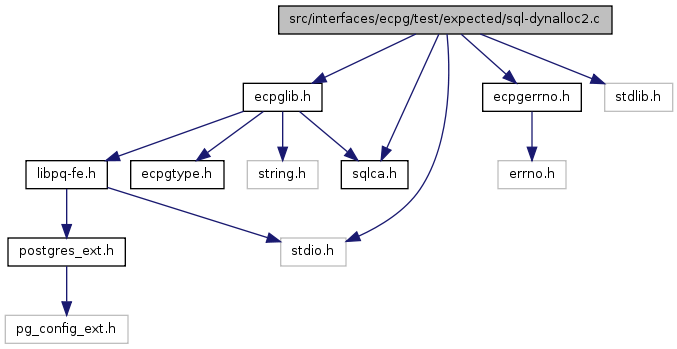#include <ecpglib.h>#include <ecpgerrno.h>#include <sqlca.h>#include <stdio.h>#include <stdlib.h>
Go to the source code of this file.
Data Structures | |
| struct | sqlca_t |
Defines | |
| #define | ECPGdebug(X, Y) ECPGdebug((X)+100,(Y)) |
| #define | PGDLLIMPORT |
| #define | SQLERRMC_LEN 150 |
| #define | sqlca (*ECPGget_sqlca()) |
Functions | |
| struct sqlca_t * | ECPGget_sqlca (void) |
| int | main (void) |
| #define ECPGdebug | ( | X, | ||
| Y | ||||
| ) | ECPGdebug((X)+100,(Y)) |
Definition at line 7 of file sql-dynalloc2.c.
| #define PGDLLIMPORT |
Definition at line 20 of file sql-dynalloc2.c.
| #define sqlca (*ECPGget_sqlca()) |
Definition at line 71 of file sql-dynalloc2.c.
Referenced by main().
| #define SQLERRMC_LEN 150 |
Definition at line 24 of file sql-dynalloc2.c.
| struct sqlca_t* ECPGget_sqlca | ( | void | ) | [read] |
Definition at line 135 of file misc.c.
{
#ifdef ENABLE_THREAD_SAFETY
struct sqlca_t *sqlca;
pthread_once(&sqlca_key_once, ecpg_sqlca_key_init);
sqlca = pthread_getspecific(sqlca_key);
if (sqlca == NULL)
{
sqlca = malloc(sizeof(struct sqlca_t));
ecpg_init_sqlca(sqlca);
pthread_setspecific(sqlca_key, sqlca);
}
return (sqlca);
#else
return (&sqlca);
#endif
}
| int main | ( | void | ) |
Definition at line 94 of file sql-dynalloc2.c.
References ECPGallocate_desc(), ECPGconnect(), ECPGd_data, ECPGd_EODT, ECPGd_indicator, ECPGdeallocate_desc(), ECPGdebug, ECPGdisconnect(), ECPGdo(), ECPGfree_auto_mem(), ECPGget_desc(), ECPGget_desc_header(), ECPGst_normal, ECPGt_char, ECPGt_descriptor, ECPGt_EOIT, ECPGt_EORT, ECPGt_int, ECPGt_NO_INDICATOR, ECPGtrans(), i, NULL, sqlca, and sqlprint().
{
/* exec sql begin declare section */
#line 9 "dynalloc2.pgc"
int * ip1 = 0 ;
#line 10 "dynalloc2.pgc"
char ** cp2 = 0 ;
#line 11 "dynalloc2.pgc"
int * ipointer1 = 0 ;
#line 12 "dynalloc2.pgc"
int * ipointer2 = 0 ;
#line 13 "dynalloc2.pgc"
int colnum ;
/* exec sql end declare section */
#line 14 "dynalloc2.pgc"
int i;
ECPGdebug(1, stderr);
/* exec sql whenever sqlerror do sqlprint ( ) ; */
#line 19 "dynalloc2.pgc"
{ ECPGconnect(__LINE__, 0, "regress1" , NULL, NULL , NULL, 0);
#line 20 "dynalloc2.pgc"
if (sqlca.sqlcode < 0) sqlprint ( );}
#line 20 "dynalloc2.pgc"
{ ECPGdo(__LINE__, 0, 1, NULL, 0, ECPGst_normal, "set datestyle to postgres", ECPGt_EOIT, ECPGt_EORT);
#line 22 "dynalloc2.pgc"
if (sqlca.sqlcode < 0) sqlprint ( );}
#line 22 "dynalloc2.pgc"
{ ECPGdo(__LINE__, 0, 1, NULL, 0, ECPGst_normal, "create table test ( a int , b text )", ECPGt_EOIT, ECPGt_EORT);
#line 24 "dynalloc2.pgc"
if (sqlca.sqlcode < 0) sqlprint ( );}
#line 24 "dynalloc2.pgc"
{ ECPGdo(__LINE__, 0, 1, NULL, 0, ECPGst_normal, "insert into test values ( 1 , 'one' )", ECPGt_EOIT, ECPGt_EORT);
#line 25 "dynalloc2.pgc"
if (sqlca.sqlcode < 0) sqlprint ( );}
#line 25 "dynalloc2.pgc"
{ ECPGdo(__LINE__, 0, 1, NULL, 0, ECPGst_normal, "insert into test values ( 2 , 'two' )", ECPGt_EOIT, ECPGt_EORT);
#line 26 "dynalloc2.pgc"
if (sqlca.sqlcode < 0) sqlprint ( );}
#line 26 "dynalloc2.pgc"
{ ECPGdo(__LINE__, 0, 1, NULL, 0, ECPGst_normal, "insert into test values ( null , 'three' )", ECPGt_EOIT, ECPGt_EORT);
#line 27 "dynalloc2.pgc"
if (sqlca.sqlcode < 0) sqlprint ( );}
#line 27 "dynalloc2.pgc"
{ ECPGdo(__LINE__, 0, 1, NULL, 0, ECPGst_normal, "insert into test values ( 4 , 'four' )", ECPGt_EOIT, ECPGt_EORT);
#line 28 "dynalloc2.pgc"
if (sqlca.sqlcode < 0) sqlprint ( );}
#line 28 "dynalloc2.pgc"
{ ECPGdo(__LINE__, 0, 1, NULL, 0, ECPGst_normal, "insert into test values ( 5 , null )", ECPGt_EOIT, ECPGt_EORT);
#line 29 "dynalloc2.pgc"
if (sqlca.sqlcode < 0) sqlprint ( );}
#line 29 "dynalloc2.pgc"
{ ECPGdo(__LINE__, 0, 1, NULL, 0, ECPGst_normal, "insert into test values ( null , null )", ECPGt_EOIT, ECPGt_EORT);
#line 30 "dynalloc2.pgc"
if (sqlca.sqlcode < 0) sqlprint ( );}
#line 30 "dynalloc2.pgc"
ECPGallocate_desc(__LINE__, "mydesc");
#line 32 "dynalloc2.pgc"
if (sqlca.sqlcode < 0) sqlprint ( );
#line 32 "dynalloc2.pgc"
{ ECPGdo(__LINE__, 0, 1, NULL, 0, ECPGst_normal, "select * from test", ECPGt_EOIT,
ECPGt_descriptor, "mydesc", 0L, 0L, 0L,
ECPGt_NO_INDICATOR, NULL , 0L, 0L, 0L, ECPGt_EORT);
#line 33 "dynalloc2.pgc"
if (sqlca.sqlcode < 0) sqlprint ( );}
#line 33 "dynalloc2.pgc"
{ ECPGget_desc_header(__LINE__, "mydesc", &(colnum));
#line 34 "dynalloc2.pgc"
if (sqlca.sqlcode < 0) sqlprint ( );}
#line 34 "dynalloc2.pgc"
{ ECPGget_desc(__LINE__, "mydesc", 1,ECPGd_indicator,
ECPGt_int,&(ipointer1),(long)1,(long)0,sizeof(int), ECPGd_data,
ECPGt_int,&(ip1),(long)1,(long)0,sizeof(int), ECPGd_EODT);
#line 35 "dynalloc2.pgc"
if (sqlca.sqlcode < 0) sqlprint ( );}
#line 35 "dynalloc2.pgc"
{ ECPGget_desc(__LINE__, "mydesc", 2,ECPGd_indicator,
ECPGt_int,&(ipointer2),(long)1,(long)0,sizeof(int), ECPGd_data,
ECPGt_char,&(cp2),(long)0,(long)0,(1)*sizeof(char), ECPGd_EODT);
#line 36 "dynalloc2.pgc"
if (sqlca.sqlcode < 0) sqlprint ( );}
#line 36 "dynalloc2.pgc"
printf("Result (%d columns):\n", colnum);
for (i=0;i < sqlca.sqlerrd[2];++i)
{
if (ipointer1[i]) printf("NULL, ");
else printf("%d, ",ip1[i]);
if (ipointer2[i]) printf("NULL, ");
else printf("'%s', ",cp2[i]);
printf("\n");
}
ECPGfree_auto_mem();
printf("\n");
ECPGdeallocate_desc(__LINE__, "mydesc");
#line 51 "dynalloc2.pgc"
if (sqlca.sqlcode < 0) sqlprint ( );
#line 51 "dynalloc2.pgc"
{ ECPGtrans(__LINE__, NULL, "rollback");
#line 52 "dynalloc2.pgc"
if (sqlca.sqlcode < 0) sqlprint ( );}
#line 52 "dynalloc2.pgc"
{ ECPGdisconnect(__LINE__, "CURRENT");
#line 53 "dynalloc2.pgc"
if (sqlca.sqlcode < 0) sqlprint ( );}
#line 53 "dynalloc2.pgc"
return 0;
}
 1.7.1
1.7.1